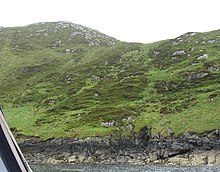Muldoanich
| Scottish Gaelic name | Maol Dòmhnaich |
|---|---|
| Meaning of name | Duncan's rounded hill |
| Location | |
| OS grid reference | NL688940 |
| Coordinates | 56°55′08″N 7°26′35″W / 56.919°N 7.443°W |
| Physical geography | |
| Island group | Uist and Barra |
| Area | 78 ha (5⁄16 sq mi) |
| Area rank | 164= [1] |
| Highest elevation | Cruachan na h-àin, 153 m |
| Administration | |
| Council area | Comhairle nan Eilean Siar |
| Country | Scotland |
| Sovereign state | United Kingdom |
| Demographics | |
| Population | 0 |
| References | [2][3][4][5] |
Muldoanich is an uninhabited island in the Barra Isles archipelago at the southern extremity of the larger island chain of the Outer Hebrides in Scotland.

The island is 78 hectares (190 acres) in area and rises to a maximum height of 153 metres (502 ft) at the peak of Cruachan na h-àin ("midday hill").[3]
Muldoanich stands about 4 kilometres (2+1⁄2 mi) southeast of Castlebay, the main port on the island of Barra, and it is a prominent landmark for the approaching ferry and other craft. It has no level ground. There are no census records, but the southern headland of Vanish (meaning "headland of the house" or "sacred place" in Gaelic) may indicate habitation at some time in the past.[3]
Etymology
[edit]The name "Muldoanich" is probably the anglicised version of the Scottish Gaelic: Maol Dòmhnaich meaning[citation needed] "Duncan's rounded hill". It is shown with that name on Ordnance Survey maps. Mul Domhnach, meaning "Sunday island", is another possible derivation. Writing in the 16th century, Dean Munro referred to the island as "Scarp" and it appears as "Scarpa" on Blaeu's atlas of 1654.[3]

Martin Martin refers to "Muldonish" in his 1695 voyage around the Western Isles, stating "about a mile in circumference; it is high in the middle, covered over with heath and grass, and is the only forest here for maintaining the deer, being commonly about seventy or eighty in number."[6]
References
[edit]- ^ Area and population ranks: there are c. 300 islands over 20 ha in extent and 93 permanently inhabited islands were listed in the 2011 census.
- ^ "Occasional Paper No 10: Statistics for Inhabited Islands" Archived 2010-04-02 at archive.today (28 November 2003) General Register Office for Scotland. Edinburgh. Retrieved 15 September 2007.
- ^ a b c d Haswell-Smith, Hamish (2004). The Scottish Islands. Edinburgh: Canongate. pp. 216–218. ISBN 978-1-84195-454-7.
- ^ 1:50,000 (Map). Ordnance Survey.
- ^ "Pàrlamaid na h-Alba placenames" (PDF). Retrieved 21 July 2007.
- ^ Martin, Martin (1703) "A Description of The Western Islands of Scotland Archived 2007-03-13 at the Wayback Machine. Appin Regiment/Appin Historical Society. Retrieved 3 March 2007.


